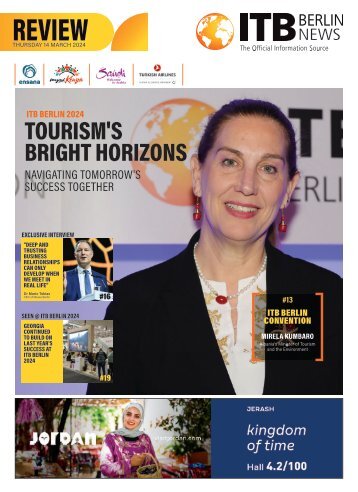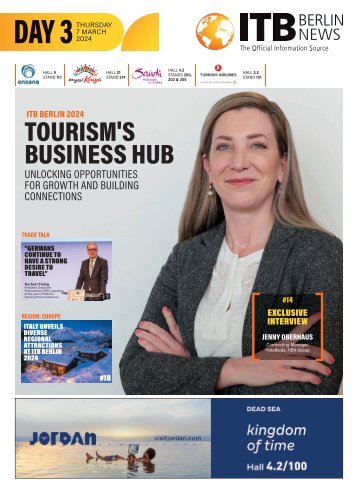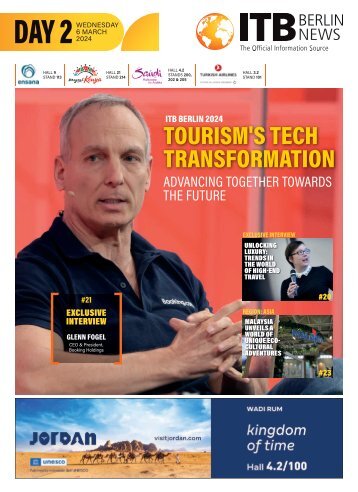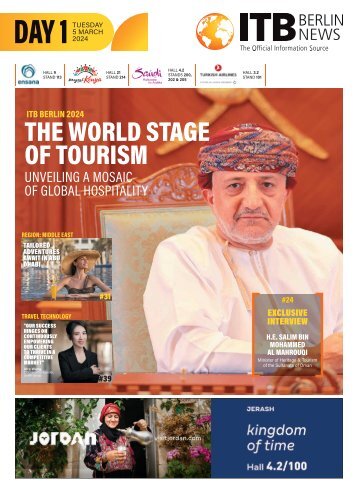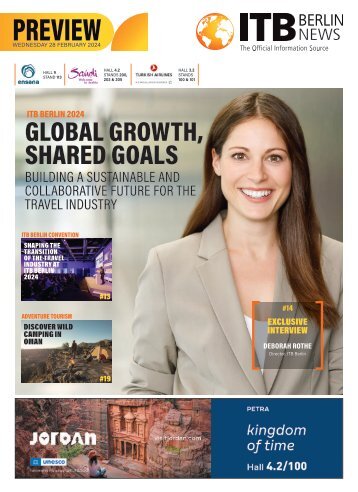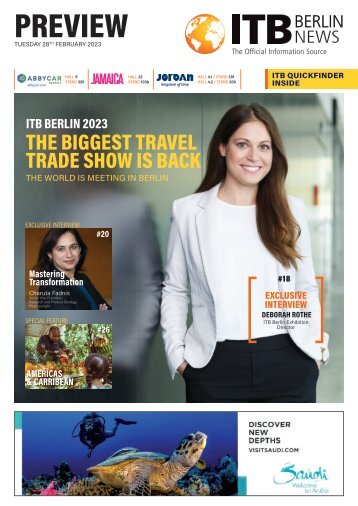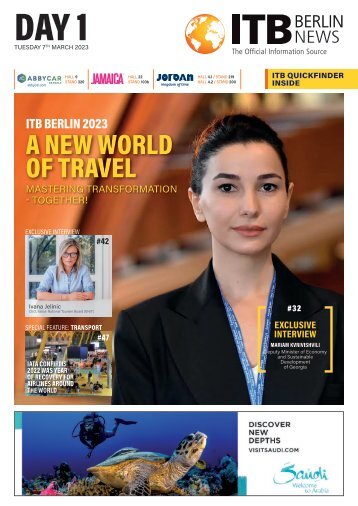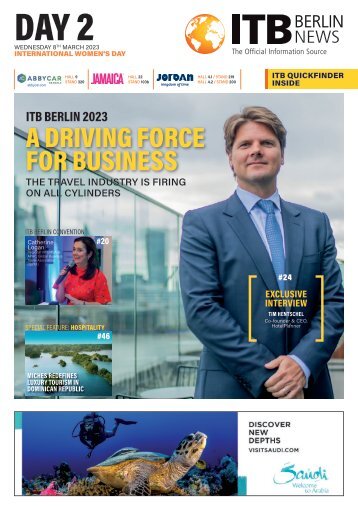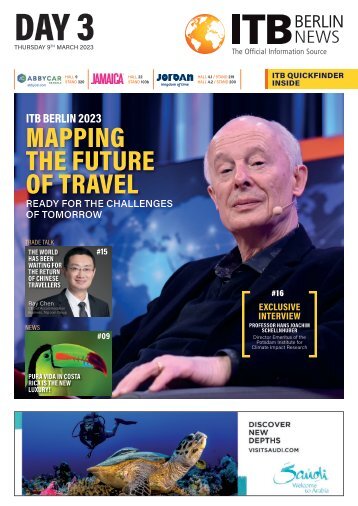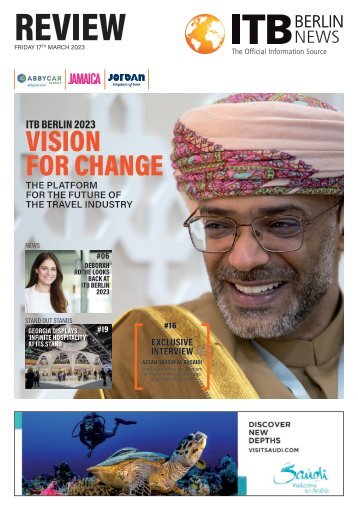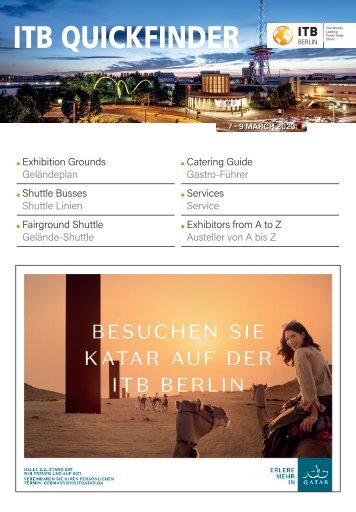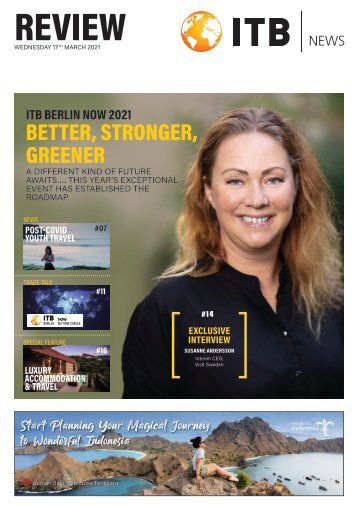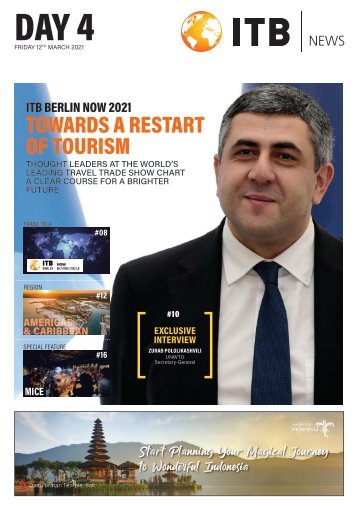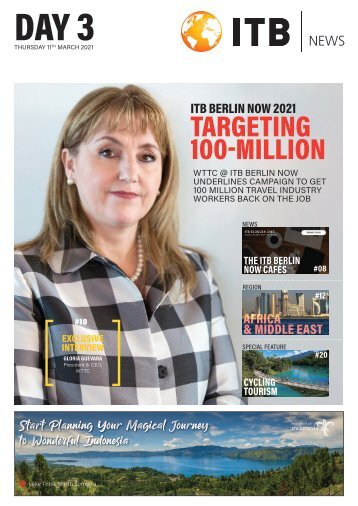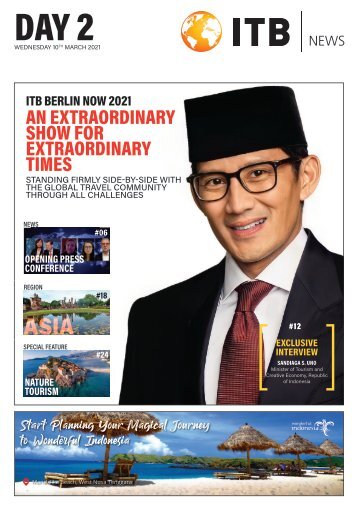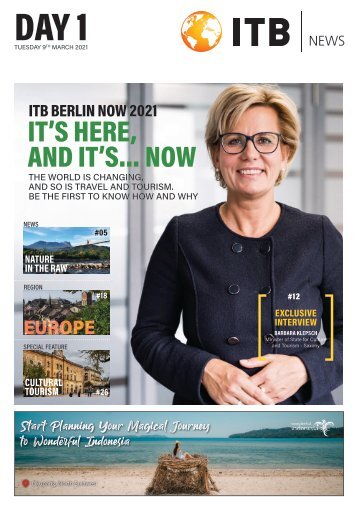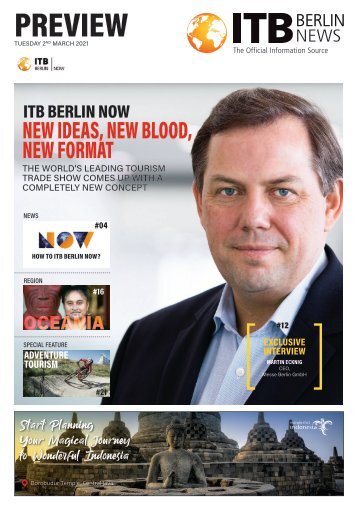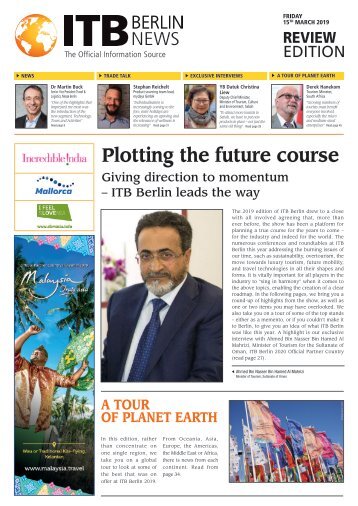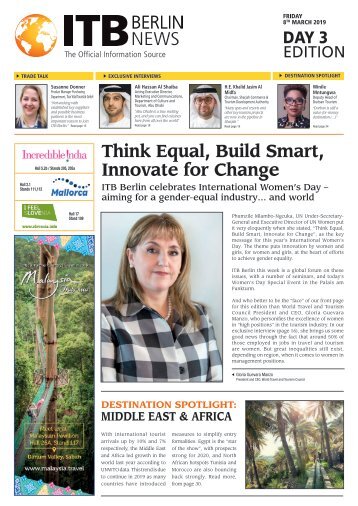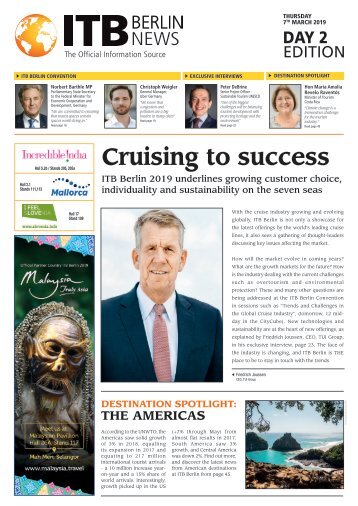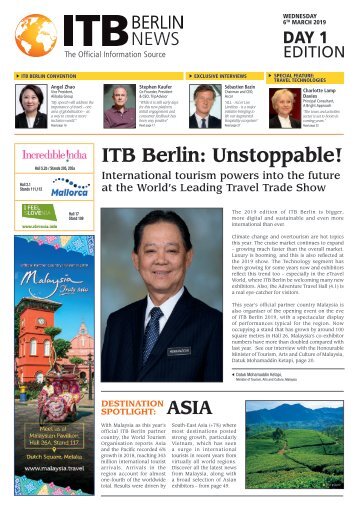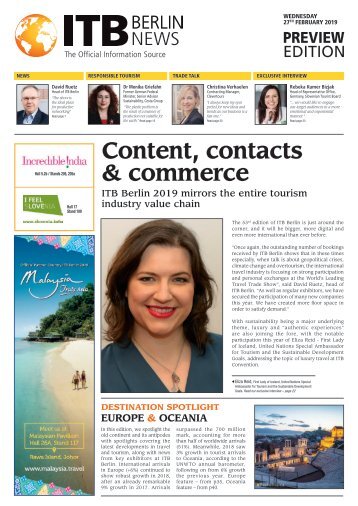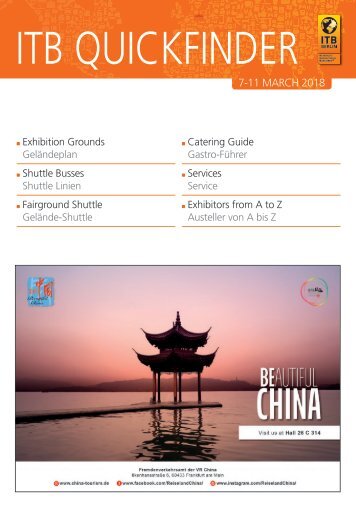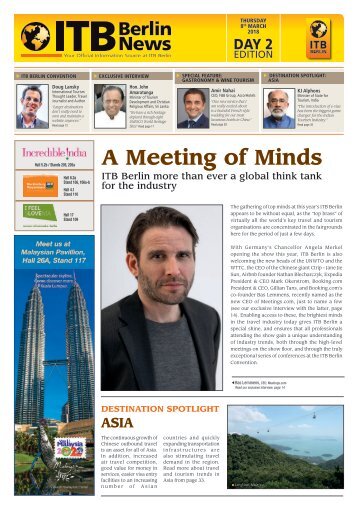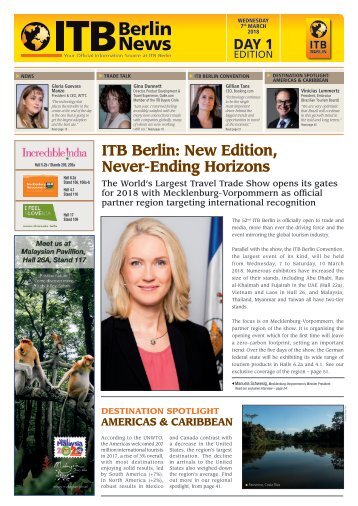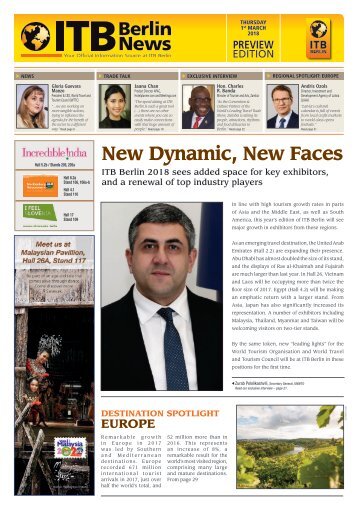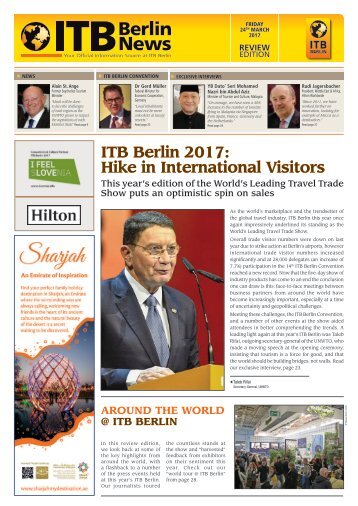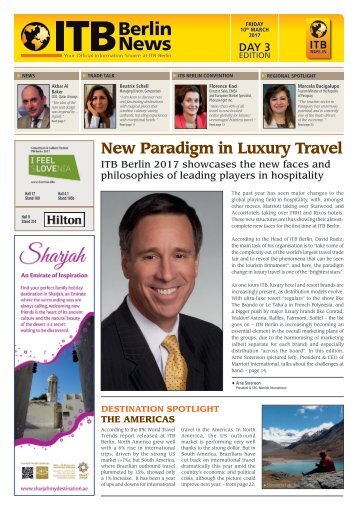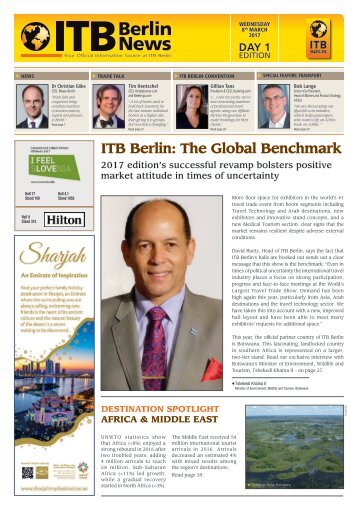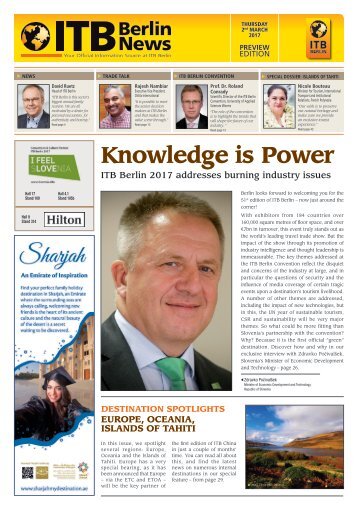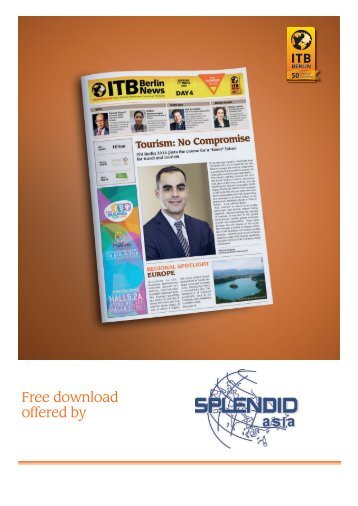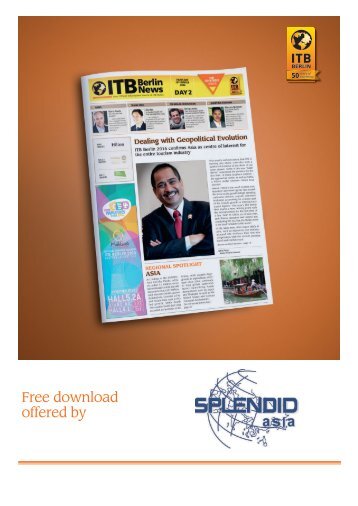
ITB Berlin News Preview Edition
20 ITB
20 ITB BERLIN CONVENTION Percy von Lipinski President, Travel Media Group HUMAN BEINGS ARE HARDWIRED TO TRAVEL. SAFETY & SECURITY: SOCIAL MEDIA AND MOBILE TECHNOLOGIES: CRISIS INTENSIFIER OR INFORMATIVE SUPPORT? Category: ITB Destination Day 2 Date: March 9, 2017 Time: 2:15 p.m. - 2:45 p.m. Location: Convention Hall 7.1a, Auditorium New York 1 Rebranding Tourism Markets Socially How social media like YouTube can regenerate struggling markets Percy von Lipinski, President of the Travel Media Group and a former award-winning reporter for CNN travel - where he was known as the CNN Travel Guru - is back at ITB Berlin for a 4th year to share his exclusive insights on tourism and social media. He starts off telling ITB Berlin News about about the secrets of YouTube. In my ITB presentation I’ll show how to create content that Google and YouTube loves to promote. Of the four main social sites (Facebok, Instagram, Twitter, YouTube), only Google and YouTube have a serious, vested interest in created content such as video, and the search engine that can find it [YouTube is owned by Google]. In other words, if you have the right video, Google will promote your content. On the other hand, if you want to be seen on Facebook you have to pay. On YouTube, make really, really good content and YouTube even pays the creator. No other social platform does this on the same scale as YouTube. How can social media be utilised to allay safety concerns in tourism markets affected by terrorism, for example. Any location that has experienced a cataclysmic event such as terrorism or any serious natural disaster must, once the dust has settled, begin the process of rebranding. Some countries may have fairly predictable weather or a safe retreat from the fury of mother nature for the most part, but no country is immune to terrorism. As such it’s vital that any tourist location has a strategy to deal with this unfortunate reality. I have worked successfully with numerous countries to help them deploy successful social network strategies, especially with YouTube. Countries that were once thought of as tourist no-go zones, including (but certainly not limited to) places such Colombia, Vietnam, Mozambique, the former Soviet Union, Burma, Bali, India, Rwanda or Central America, had all fallen into the abyss. But they have all have come back stronger than ever. In fact, every year that tourists stay away will only create more long-term demand with people looking for new places to visit once they “believe” they are safe. After a disaster, the first thing to do is accept that the problem has occurred and that it must be dealt with using a plan. Sometimes a country will either try to minimize, even pretend it didn’t happen, or insinuate that it was a rare one-off event. That is of course a huge mistake. Focus on rebranding. Begin by showing the rebuilding, invite YouTubers to your location (when you’re sure it’s safe), show them success stories and your determination to come back. Now is the time to sponsor a festival. Have fun! Stay away from suffering and the political message of the attack. Realize that a segment of the tourist market will always be on the lookout for the next great travel bargain which they assume will be happening at your destination at some point. Help them. Your local tourism partners must all be in on your plan. Everybody loves a comeback story. In my ITB Berlin talk I will provide several effective strategies that I have used with countries to speed up the rebranding strategy. Why do you think the tourism industry remains so durable, despite the significant challenges? At times like these it’s good to remember some of the reasons we travel in the first place. Human beings are hardwired to travel. We started out as nomads, and we still are and always will be. In the words of that futuristic traveller, “I’ll be back”. ITB BERLIN NEWS • Thursday 2 nd March 2017 www.itb-berlin-news.com
ITB BERLIN CONVENTION 21 Arnaud Masson Chief Operations Officer Europe, Voyages-sncf.com Laurent Queige Managing Director, Welcome City Lab SMART TOURISM: KNOWING WHAT CUSTOMERS WANT BEFORE THEY DO Category: eTravel Stage Date: March 10, 2017 Time: 1:00 p.m. - 1:30 p.m. Location: Hall 6.1, eTravel Stage WELCOME CITY LAB, INCUBATOR DEDICATED TO TOURISM INNOVATION IN PARIS Category: eTravel Stage Date: March 10, 2017 Time: 3:00 p.m. - 3:30 p.m. Location: Hall 6.1, eTravel Stage Smart Tourism Knowing what customers want before they do Welcome City Lab Incubator dedicated to tourism innovation in Paris With the exponential growth of the Internet of Things and the surge of open data platforms, Smart Tourism is becoming a buzzword for the future of the travel and tourism industry. At the eTravel Stage of the ITB Berlin Convention, Arnaud Masson, Chief Operations Officer Europe, Voyages-sncf.com will look at how social networks can be utilised, trends can be identified and patterns of customers’ booking behaviour can be anticipated. We asked him to tell us a little more… Big data technologies allow us to learn how our customers behave so that we can anticipate their requests when they come to us on subsequent occasions. By identifying trends and patterns in customer booking behaviour, we can deliver them the information and options which will most suit them at the most appropriate time and via the most convenient device. We are constantly learning from customer activities, analysing data and using that accumulated knowledge to deliver solutions at the right time and in the right place. Each month, we deal with more than 90 TB of data that we use in order to facilitate and enhance our clients’ customer experience. Consumers today expect e-commerce businesses to remember their details and preferences and its part of building a relationship with the customer. It is vital to guarantee customer loyalty and that’s why we invest heavily in our technical and development teams. Over one third of our total employees are involved in development and innovation. How do you leverage social networks in this respect? A. It must be simple for people to get in touch with companies and so you have to make sure that your brand is present on the channels that people use every day. With 1.79 billion monthly active Facebook users and 1 billion Messenger users, it is clear to see the online space consumers are inhabiting. Social media is an extension of company websites and apps and consumers now expect to be able to manage their bookings directly via their social channels The ITB Berlin Convention’s eTravel Stage takes a close look at “inventing the future of tourism” in Paris. We asked Laurent Queige, Managing Director, Welcome City Lab, to tell us about his presentation… We are convinced that young entrepreneurs contribute to designing the future of travel. But usually start-ups don’t come from this industry. They have 3 kinds of profiles: they have a strong international background; they are serial entrepreneurs who have already created companies in other economic sectors; they are digital engineers. So they need 3 services: 1/ a place where they can meet major tourism companies in order to find their first clients; 2/ someone who can coach them to grow faster than they would if they stayed working in their garage; 3/ an opportunity to meet investors and venture capitalists to finance their development. These 3 services are provided by Le Welcome City Lab. What are the key goals of Welcome City Lab and how does it work? Our major goal is to position Paris as the leading city in tourism innovation. We aim at helping start-ups become international references on their market. We also help traditional operators (hotels, agencies, venues, etc.) learn about innovation. We now run an academy: we organise events, meetups, brainstorming sessions in order for our ecosystem to find answers to their questions. Who’s behind the project? How did it come about? Le Welcome City Lab is managed by a steering committee composed of 10 industrial groups (Amadeus, Air France, Paris Airports, Carlson Wagonlit Travel, Galeries Lafayette, Paris Inn Group, RATP, SkyBoard, Sodexo, Viparis) and 5 public entities (City of Paris, Paris Tourist Office, Ministry for Tourism, National Investment Bank, Caisse des Dépôts). As a tourism professional for the past 25 years, I realised that no-one before had the idea of dedicating an incubator to the travel industry. I worked on the project for one and a half years and found the financial partners. Le Welcome City Lab was officially launched in July 2013 ITB BERLIN NEWS • Thursday 2 nd March 2017
- Page 1: THURSDAY 2 nd MARCH 2017 PREVIEW ED
- Page 4 and 5: 4 NEWS Personal Encounters, Authent
- Page 6 and 7: 6 NEWS ITB Berlin 2016 - South Entr
- Page 8 and 9: 8 NEWS Responsible Tourism: Meet th
- Page 11 and 12: TRADE TALK 11 The Ultimate Buyers
- Page 13: TRADE TALK 13 Rajesh Nambiar Execut
- Page 16 and 17: 16 ITB BERLIN CONVENTION ITB BERLIN
- Page 18 and 19: 18 ITB BERLIN CONVENTION Jens Thrae
- Page 22 and 23: 22 ITB BERLIN CONVENTION Caroline B
- Page 24 and 25: 24 EXCLUSIVE INTERVIEW Jean-Claude
- Page 26 and 27: 26 EXCLUSIVE INTERVIEW Slovenia - I
- Page 28 and 29: 28 SPECIAL FEATURE CAREERS ITB Care
- Page 30 and 31: 30 REGION EUROPE Europe Outbound Eu
- Page 32 and 33: 32 REGION EUROPE With a growing Chi
- Page 34 and 35: 34 REGION EUROPE 3 German Travel Ma
- Page 36 and 37: 36 REGION EUROPE ADVERTORIAL Georgi
- Page 38 and 39: 38 REGION OCEANIA Double Digit Grow
- Page 40 and 41: 40 REGION OCEANIA © Jeremy Weate W
- Page 42 and 43: 42 SPECIAL DOSSIER: ISLANDS OF TAHI
- Page 45 and 46: Hall 5.2a / Stand 105
- Page 47: SPECIAL DOSSIER: ISLANDS OF TAHITI
- Page 50 and 51: 50 SPECIAL DOSSIER: ISLANDS OF TAHI
- Page 52 and 53: 52 SPECIAL DOSSIER: ISLANDS OF TAHI
- Page 54 and 55: 54 SPOTLIGHT ON GERMAN REGION: BAVA
- Page 56 and 57: 56 SPOTLIGHT ON GERMAN REGION: BAVA
- Page 58: 58 Restaurants SPINDLER & KLATT Des
Inappropriate
Loading...
Mail this publication
Loading...
Embed
Loading...
